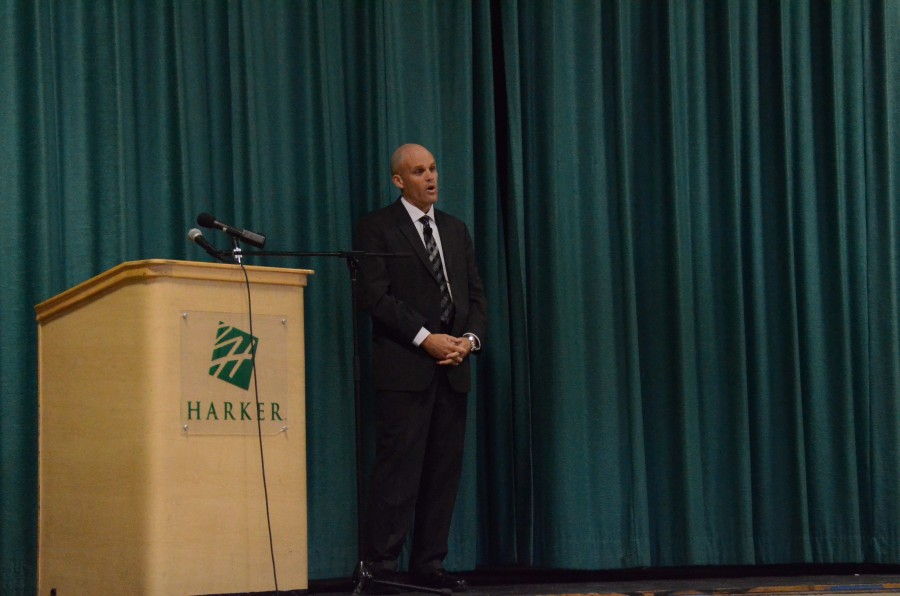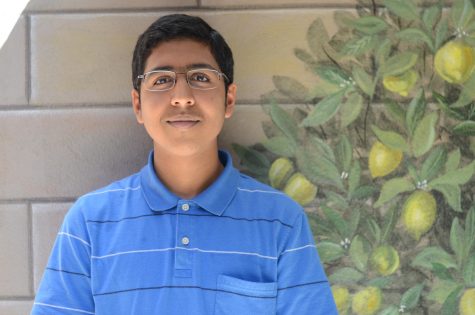Harker alum John B. Owens (‘85) discusses his experiences in becoming a federal judge of the ninth circuit
Judge John B. Owens speaks about his childhood as it affected his career as a judge. The honor council reached out to Owens to speak about his experiences after Harker.
March 1, 2016
Federal judge for the ninth circuit and Harker alum John B. Owens (‘85) talked to upper school students today at an assembly on behalf of the Honor Council.
Judge Owens is from the U.S court of appeals for the ninth circuit, which is one level below the Supreme Court. Owens graduated first from his class at Stanford Law School and worked as an attorney in the U.S. Department of Justice, as well as an assistant to a law firm. In 2013, he was nominated to the ninth circuit by President Obama, and the full Senate confirmed his appointment in the next year.
“I was talking with Joe Rosenthal at the beginning of the school year, and I mentioned that I was interested in organizing a talk for the Honor council,” Millie Lin (10) said. “He was super helpful in recommending Judge Owens, a Harker alum who he knew very well, and introduced me to him through email.”
Owens talked about his life as as a child first, then discussed his job. He then took questions from the audience.
In search of a school for Owens to attend when he was a child, his mother found Harker to be most convenient for her commute to work, next to 280 freeway and offering afterschool care. Compared to the Berkeley Unified school district, the Harker environment was different. He had to wear a uniform everyday, but each student provided stability and a place to be accepted for him and his interests.
At age 13, he became an employee at Harker to watch over first graders, through which he learned responsibility.
“Opportunity might not have presented itself,” Owens said. “Harker made sure I was going on the right path, and it made the difference in my career.”
After serving as a prosecutor for 11 years, Judge Ruth Ginsburg offered Owens to be a judge of the 9th circuit, as he was in search of a justice who could represent San Diego. He underwent the application process and filled
Owen’s job consists of meeting with his fellow judges seven times a year for a week. They hold conferences to preside over several judicial cases at a time and afterwards write explanations and opinions regarding the cases. After presenting his talk, Owens answered several questions from the audience regarding Harker’s impact on his career and his job as a justice.
Honor council junior representative Chetana Kalidindi inquired about the involvement of the Harker honor code in his life after graduating.
“The Honor Code was not enumerated back then, but people generally knew what it was,” Owens said. “The challenge was to make people actually do it.”
Alex Youn (11) asked about the most difficult ethical decision Owens had to make as a justice.
“Probably the hardest part is delivery of sentences,” Owens said. “I personally, don’t deal with the pain as much as other judges because I don’t see their faces. At the end of the day, however, the defendant did something bad and will be punished for his actions.”
Student response varied widely with respect to Owens’ speech
“I thought it was very interesting and different from previous speakers,” Maile Chung (11) said. “It’s great that he’s an alum because he understands our point of view, being a previous Harker student.”
With regards to the overall student response, Andy Wicklund, a faculty advisor for the honor council, reflected on Owen’s presentation.
“It wasn’t the idea of bringing somebody in to speak so much about law in a right versus wrong way,” Wicklund said. “He talked about the ethical dilemmas that turn up with respect to doing the right thing. We didn’t ask him to deliver that message, but it’s really wonderful that he did.”
Owens is currently on the Harker board of trustees. In the future, Honor Council plans to invite more speakers to the Upper School to share their experiences.




![LALC Vice President of External Affairs Raeanne Li (11) explains the International Phonetic Alphabet to attendees. "We decided to have more fun topics this year instead of just talking about the same things every year so our older members can also [enjoy],” Raeanne said.](https://harkeraquila.com/wp-content/uploads/2025/10/DSC_4627-1200x795.jpg)


















![“[Building nerf blasters] became this outlet of creativity for me that hasn't been matched by anything else. The process [of] making a build complete to your desire is such a painstakingly difficult process, but I've had to learn from [the skills needed from] soldering to proper painting. There's so many different options for everything, if you think about it, it exists. The best part is [that] if it doesn't exist, you can build it yourself," Ishaan Parate said.](https://harkeraquila.com/wp-content/uploads/2022/08/DSC_8149-900x604.jpg)




![“When I came into high school, I was ready to be a follower. But DECA was a game changer for me. It helped me overcome my fear of public speaking, and it's played such a major role in who I've become today. To be able to successfully lead a chapter of 150 students, an officer team and be one of the upperclassmen I once really admired is something I'm [really] proud of,” Anvitha Tummala ('21) said.](https://harkeraquila.com/wp-content/uploads/2021/07/Screen-Shot-2021-07-25-at-9.50.05-AM-900x594.png)







![“I think getting up in the morning and having a sense of purpose [is exciting]. I think without a certain amount of drive, life is kind of obsolete and mundane, and I think having that every single day is what makes each day unique and kind of makes life exciting,” Neymika Jain (12) said.](https://harkeraquila.com/wp-content/uploads/2017/06/Screen-Shot-2017-06-03-at-4.54.16-PM.png)








![“My slogan is ‘slow feet, don’t eat, and I’m hungry.’ You need to run fast to get where you are–you aren't going to get those championships if you aren't fast,” Angel Cervantes (12) said. “I want to do well in school on my tests and in track and win championships for my team. I live by that, [and] I can do that anywhere: in the classroom or on the field.”](https://harkeraquila.com/wp-content/uploads/2018/06/DSC5146-900x601.jpg)
![“[Volleyball has] taught me how to fall correctly, and another thing it taught is that you don’t have to be the best at something to be good at it. If you just hit the ball in a smart way, then it still scores points and you’re good at it. You could be a background player and still make a much bigger impact on the team than you would think,” Anya Gert (’20) said.](https://harkeraquila.com/wp-content/uploads/2020/06/AnnaGert_JinTuan_HoHPhotoEdited-600x900.jpeg)

![“I'm not nearly there yet, but [my confidence has] definitely been getting better since I was pretty shy and timid coming into Harker my freshman year. I know that there's a lot of people that are really confident in what they do, and I really admire them. Everyone's so driven and that has really pushed me to kind of try to find my own place in high school and be more confident,” Alyssa Huang (’20) said.](https://harkeraquila.com/wp-content/uploads/2020/06/AlyssaHuang_EmilyChen_HoHPhoto-900x749.jpeg)









